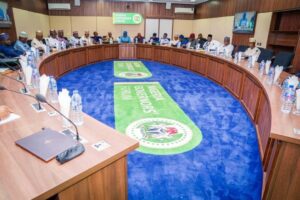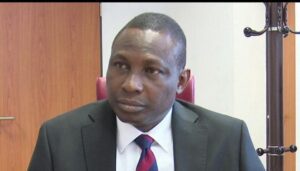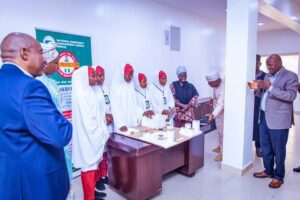


Reps dumps Bill seeking University degree as minimum qualification for President, Vice, others
The House of Representatives on Tuesday stepped down a bill seeking to change the minimum requirement for the offices of President, Vice President, National Assembly members and other political offices from first school leaving certificate to degree or its equivalent.
This followed the passage of a bill moved by Rep Adewunmi Onanuga during the plenary on Abuja.
The bill is titled “A Bill for an Act to Alter the 1999 Constitution of the Federal Republic of Nigeria (as amended) to change the Educational Qualification for Elections into Certain Political Offices and for Related Matters.”
Debating on the general principles of the bill, Onanuga called on the House to look critically into the educational qualification of political office holders, stating that Nigeria has moved past a school leaving certificate as the minimum requirement to contest political office, adding that degree or its equivalent should be made a minimum requirement.
Speaking in favour of the bill, Babajimi Benson from (Lagos State) said, “Anyone who is going to oppose this bill should tell if his son or daughter is in the university or not. I can’t believe that in this modern age, some people will say don’t go to school but yet go and be the president.”
Professor Julius Ihonvbare said, “We all know what the world is today. In a world where knowledge is power, we see leaders of other nations who make excellent presentations, but here we have leaders dodging debate. I don’t think this requirement should apply to all political offices, for local government it might not be required, but for President and Vice, National Assembly members should be required to own a degree.”
Leke Abejide (Kogi) said, “The world has moved, Nigeria should not be left behind, We put a mediocre to head an important political office and we will end up in disaster.”
Alfred Iliah from (Jos) said educational qualification is very important and the bedrock of every society.
According to him, the qualification of every National Assembly member should be looked into if the country must make progress.
Mustapha Aliyu from (Sokoto) said, “This amendment is long overdue. Education is the bedrock of the development of any society. Those contesting for the executive seats should have a degree. However, the jump from leaving school to a degree is too wide. I will propose that there should be a middle course.
Shetimma Lawal (Borno) said, “Requirement for Governance should cut across all levels from the highest to the lowest. For politicians we are only providing leadership, political offices should be categorised.”
According to Kingsley Chinda, the Minority Leader, while endorsing the bill, he remarked on the declining standard of education, stating that raising educational requirements would motivate Nigerian youth.
He emphasised the importance of backing the effort wholeheartedly.
“Why do we say a primary school holder should be given? We should do the right thing,” he queried.
Speaking against the bill, Aliyu Madaki from (Kano) said the leadership quality of a political office holder is not determined by the level of education.
“Whatever we are trying to do is for all Nigerians. I have an MBA in financial management but restricting others with qualifications will not carry all Nigerians along. All Nigerians should be allowed to participate and exercise their leadership qualities,” he said.
Bashir Sokoto (Sokoto) said, “We were privileged to go to university, but we have less privileged Nigerians who cannot afford to go to the university. I propose that we allow a minimum requirement for political office holders to remain school certificate.
Ahmed Jaha from Borno said passing the bill would negatively affect some sections of the country.
He insisted that educational qualification was not a true test of knowledge.
“Qualification alone is not a true test of knowledge. We are making laws for good governance and peace in this country. We will not make laws that will favour only a few number of Nigerians. How many Nigerians are degree holders? America that we refer to has done greatly in educating its citizens but here in Nigeria what have we done in improving our education system?” he queried.
Also speaking against the bill, Inuwa Garba (Gombe) said, “The mover of this bill is not aware of what is happening in some parts of this country. Some schools in some parts of the country have been shut down for a while now. A certificate is not a true test of knowledge.”
The bill is discriminatory against some people.
After a heated debate, the bill was stepped down by the presiding officer, Hon Benjamin Kalu.



